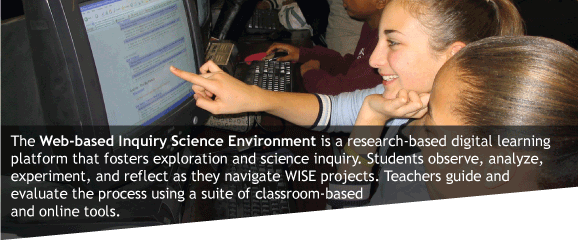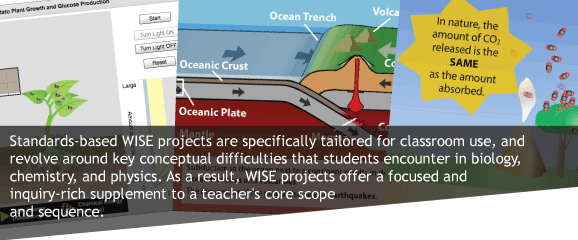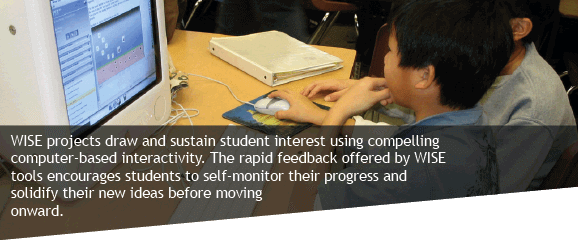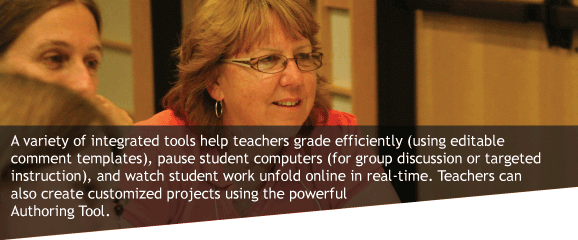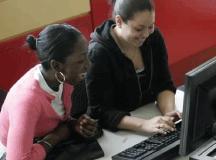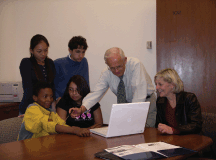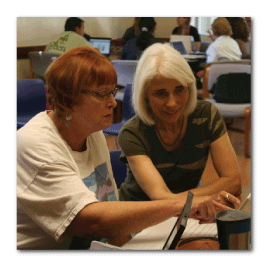WISE at the 2021 STEM for All Video ShowcaseMay 11, 2021
Check out our latest cutting-edge work using natural language processing (NLP) to empower teachers and students to take action to promote social justice through science learning and teaching!
At the 2021 NSF STEM for All Showcase, we present recent work from our from our (STRIDES) project, a collaboration with ETS that leverages NLP to capture students? evolving understanding of Next Generation Science Standards (NGSS) three-dimensional learning. Milestone reports pair distributions of student responses with evidence based instructional opportunities that support teachers to notice student ideas and tailor instruction for their students.
Watch how WISE partner teachers utilize this data to adjust instruction based on their students? specific needs. See how they are customizing WISE curricula to address social justice topics critically important to their students? lives, enabling students to plan anti-racism actions through science learning.
Let us know your thoughts and send us questions using the public discussion forum. And feel free to vote for our video as a Public or Presenter's Choice! We look forward to hearing from you.
WISE updated with new translations!May 11, 2021
We just updated the WISE website with the latest translations. Special thanks to our volunteer translators, who allow WISE to reach a wider audience!!
You can view WISE in different languages by setting your browser?s language settings to any of the languages above and visiting the WISE homepage. You can also go directly to the different sites, like https://wise.berkeley.edu/zh-Hans (for Simplified Chinese), or https://wise.berkeley.edu/es (for Spanish).
We need help translating the WISE platform and tools! Please check out our translation tool and start contributing. If you?d like to translate WISE to a language that is not listed, please let us know.
New article featuring WISE and our ARISE projectMar 17, 2021
The 74, a non-profit, non-partisan news site covering education in America has published a new article featuring WISE and work from our newest initiative, Anti-Racism Interactive Science Education (ARISE).
The piece is titled "As Schools Reopen, Teachers Need Materials That Can Keep Their Students Engaged & Learning. Open Educational Resources Can Help" and is written by Dr. Anegla Debarger of the Hewlett Foundation (a generous supporter of our work). It highlights the experience of a WISE partner teacher and how she is using WISE to integrate social justice topics into her teaching of chemical reactions and environmental science.
Check it out and let us know what you think!
WISE anti-racism science education workshop featured by bluknowledgeMar 16, 2021
Erika Tate is the founder of bluknowledge and advisor to our newest initiative, Anti-Racism Interactive Science Education (ARISE). ARISE is a partnership of researchers and science teachers that investigates how incorporating anti-racism Open Educational Resources (OERs) can strengthen science units by promoting integrated understanding of science and developing commitments to oppose racism and promote equity.
In Erika's latest Partner Spotlight, Erika discusses the ARISE partnership and our successful first teacher workshop series held in February 2021. Check it out!
Presenting WISE at the 2020 NSF STEM for ALL Video ShowcaseMay 5, 2020
We invite you to check out the 2020 NSF STEM for All Showcase where we present recent work from our Supporting Teachers in Responsive Instruction for Developing Expertise in Science (STRIDES) project. Come learn about how we're providing teachers with student data to help them customize instruction and adapt to distance learning in the age of COVID-19! And feel free to vote for our video as a Public or Presenter's Choice. :)
WISE listed by NSF as a CADRE resourceMay 5, 2020
WISE has been highlighted by the National Science Foundation as a featured STEM education resource on the Community for Advancing Discovery Research in Education (CADRE) website!
WISE highlighted in UC Berkeley's Graduate School of Education articleApr 15, 2020
WISE was recently mentioned in UC Berkeley's Graduate School of Education website. You can read the article here: "WISE Teaching: Teachers Customizing Online Science for Distance Learning".
WISE Support for Distance LearningMar 29, 2020
The Web-Based Inquiry Science Environment (WISE) provides standards-aligned online inquiry science units. Our team is now working directly with teachers to implement, customize, and create web-based distance learning curricula for their students. We are hosting weekly office hours, facilitating teachers to collaborate on strategies for customizing WISE to create their own instruction, and supporting students and families. WISE is free to use and available worldwide.
In this challenging time, teachers are doing innovative work to ensure their students have engaging science learning opportunities and are connecting with their peers and teachers. They are connecting with colleagues to share ideas and resources and are adapting WISE units to meet the needs of their students.
Are you interested in using WISE with your students? Or are you a family member looking to supplement your students' learning while at home? We want to help! Join us for weekly Zoom office hours every Monday from 1-3pm PDT. We will answer any questions you might have and can help you facilitate and/or customize WISE units. Our Zoom meeting link is https://berkeley.zoom.us/j/209167075. You can also join our WISE Community at https://wise-discuss.berkeley.edu, contact us via email or our Contact page at any time with questions or comments. We'd love to hear about your experiences, challenges, and successes in adapting your teaching to a distance learning model!
We wish everyone good health and hope you're all staying safe! Best wishes,
The WISE Team
No longer supporting legacy unitsMar 12, 2020
We have removed support for legacy WISE units. Rest assured, WISE users can still review student work from previous classroom implementations and view legacy unit content in preview mode. But they will no longer be able to create new legacy units or run them with their students. If there is a legacy unit that you want to use in the future, we suggest that you browse the WISE Tested units to find a replacement or contact us if you're interested in upgrading a unit. Thanks!
Presenting WISE at the 2019 NSF Stem for All ShowcaseMay 14, 2019
We invite you to check out the 2019 NSF STEM for All Showcase, where we present recent work from our Project Learning with Automated, Networked Supports (PLANS) project. Come learn about the power of student choice in design projects!
WISE is looking for a post-doctoral scholar!Nov 9, 2018
We are looking for a new post-doctoral scholar to join the WISE Research Group! From more information and to submit an application check out the job posting. Please contact David Crowell at dcrowell@berkeley.edu with any questions. Thanks!
WISE Site Redesign Coming Soon!Nov 6, 2018
Next week we will be releasing a new updated WISE website! This includes a new homepage and user portals for students and teachers. Be on the lookout for a revamped WISE unit library and better support for all devices and screen sizes.
WISE Authoring Tool Help VideosAug 8, 2018
We started producing tutorial videos for the WISE authoring tool. Check out our first video on how to create a WISE project here. As we add more, they will be linked in the authoring tool help documentation.
New Authoring Tool Help DocumentationJun 1, 2018
Interested in creating or editing a WISE project? Check out our new authoring tool help documentation here: https://wise.berkeley.edu/help/authoring.
Sequence of NGSS WISE unitsJan 19, 2018
6th grade teachers are gathering to decide a sequence of WISE units to use for teaching the full NGSS disciplinary standards for the year. Korah Wiley, graduate student, is working with the teachers to customize units to strengthen the links across topics.
New ModelsJan 8, 2018
Two teachers are using a new model and dynamic graph to help students design an optimal insulator for hot and cold drinks. Check out the new model and graph!
Automated GuidanceJan 4, 2018
One of our teachers customized the automated guidance and teacher alerts based on student essays in the Plate Tectonics unit to identify and personalize guidance for all her students. Students made extraordinary improvements on their essays using the combination of teacher and computer guidance!
New RubricsNov 1, 2017
Rubrics including student work examples for automatically scored embedded assessments are now accessible when you preview a project. Try it out in the Thermo Challenge!
2017 WISE Researcher WorkshopAug 3, 2017
Researchers met for our annual researchers workshop in UC Berkeley from July 31-August 3. We shared our research findings and brainstormed future directions. The technology team gave a great demo introducing a lot of new WISE features.
2017 WISE Teacher WorkshopJun 24, 2017
We will be hosting our annual WISE teacher workshop at UC Berkeley from June 26-28. Teachers will share their experiences running WISE projects during this past year.
WISE in another languageMar 17, 2017
Want to use WISE in another language? Contact us and help us translate WISE using our online form!
WISE 5.0 Released!Mar 14, 2016
A brand-new version of WISE has been released! See this post to learn more. If you are a developer or a designer, come join our open-source project!
WISE URL changesNov 9, 2015
We're making changes to the URL of some pages in WISE so that they are shorter and easier to remember. Please click here for details.
2015 NSF Video ShowcaseMay 11, 2015
Check out and vote for our video on automated guidance as part of the 2015 National Science Foundation Video Showcase here!
New Article on WISEJan 28, 2015
WISE researchers recently published an article on WISE teachers customizing units. You can read it here. Please feel free to post your feedback on the discussion forum.
New Grading ToolJan 13, 2015
We have added a new and greatly improved grading tool to WISE. You will find a link to it for each project run you have created. We will continue to work on it and would appreciate any feedback you could provide to help us make it better.
WISE in SpanishFeb 14, 2013
WISE is collaborating with a group in Argentina to create versions of all our activities in Spanish. Check out the Detergents project in Spanish!
WISE included in STEMworks DatabaseAug 17, 2012
WISE has been chosen as an example program that "deepen(s) young people's learning in science, technology, engineering and mathematics" after a rigorous review by WestEd and the non-profit Change the Equation (CTEq) initiative and has been included in the STEMworks database.
WISE Book ReviewAug 17, 2012
Science Learning and Instruction (by WISE Director Marcia Linn & Bat-Sheva Eylon) has been reviewed in the journal Research & Practice in Assessment.
WISE research highlighted by NSTAJun 27, 2012
Research by Kevin McElhaney and WISE director Marcia Linn identified by the National Science Teachers Association's Connections feature as suggested summer reading of current research in science education.
WISE featured in Magazine of the Teachers College, Columbia UniversityJun 27, 2012
Pushing the Right Buttons, by Joe Levine, highlights how WISE tools help teachers understand the needs of individual students and support students to iteratively refine and develop scientific understanding.
June 2012 workshopJun 27, 2012
The LOOPS/CLEAR/CLASS workshop is officially in session! This year's theme is feedback: What makes useful feedback? How can we provide better feedback? How can we design technology supports for using feedback more efficiently and effectively in the classroom? See the workshop website for more details: https://sites.google.com/site/telsworkshops/.
WISE4.5 is released!May 14, 2012
A stable release of WISE v4.5 is now available for download from http://wise4.org/. Among other goodies, there are tools for autoscoring and feedback, an easier authoring interface, and new customizable features in the Idea Manager tool. See the WISE4-Discuss Google Group for details! Click Here
New MItosis ProjectJun 27, 2012
The "Mitosis and Cell Processes Project, one of our most popular, has been completely updated. You will find it titled "What makes a good cancer medicine?: Observing mitosis and cell processes" in our Library.
AERA 2012Mar 19, 2012
We're getting ready for AERA in Vancouver, BC! New research presented April 13-17 by Marcia Linn, David Miller, Kelly Ryoo, and Hillary Swanson. Check us out on the AERA program!
WISE Server DowntimeFeb 6, 2012
The WISE server will be down for maintenance on Sunday February 12th from 10:00 AM to 1:00 PM Pacific Standard Time. WE are sorry for any inconvenience.
New Design!Aug 10, 2011
We're excited to unveil our new design for WISE! Tell us what you think. We're still ironing out the bugs, so if you find any problems, let us know.
New WISE Projects!Aug 10, 2011
Great new projects have been added to our Library: "How Can Detergents be Used to Clean Oil Spills?" and "How Can We Recycle Old Tires?" for high school chemistry classes and "Investigating Planetary Motion and Seasons" for use in high school earth science or general science classes.
New Book PublishedApr 30, 2011
Linn & Eylon (2011). Science Learning and Instruction: Taking Advantage of Technology to Promote Knowledge Integration.
New Review PaperAug 8, 2011
Gerard, Varma, Corliss, & Linn (in press). "Professional development in technology-enhanced inquiry science." Available online.
Blueprint for Great SchoolsAug 9, 2011
CA State Superintendent of Public Instruction Tom Torlakson calls for connecting children to the online world in the classroom and at home. See http://www.cde.ca.gov for more details.
WISE4 Now AvailableAug 26, 2010
We are pleased to announce that our new learning environment WISE4 is now available in open beta format. WISE4 does require creating a new account. There continues to be no cost or commitment to joining. We will be continuing to add new projects over the next few months. Let us know what you think.
WISE 4.0 ProgressDec 1, 2009
We are currently in beta testing with our partner schools. We are looking forward to full release in the fall of 2010. Keep checking in for updates.
